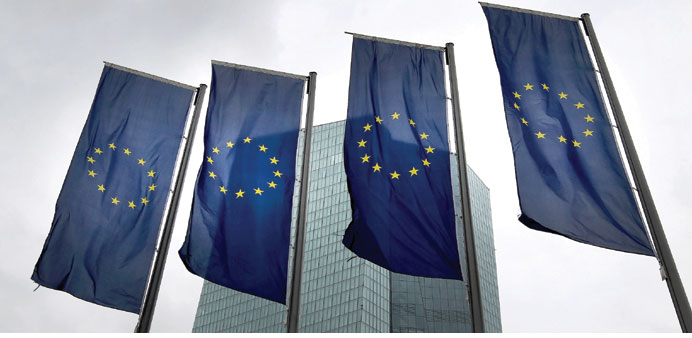Flags of the European Union are displayed outside the headquarter of the European Central Bank (ECB) in Frankfurt am Main, western Germany. Common political institutions, accountable to voters across the eurozone, would provide a democratic fiscal counterpart to the ECB and help cage German power.
By Philippe Legrain/London
The eurozone has a German problem. Germany’s broader crisis response that the country has led has proved disastrous.
Seven years after the start of the crisis, the eurozone economy is faring worse than Europe did during the Great Depression of the 1930s. The German government’s efforts to crush Greece and force it to abandon the single currency have destabilised the monetary union.
As long as German Chancellor Angela Merkel’s administration continues to abuse its dominant position as creditor-in-chief to advance its narrow interests, the eurozone cannot thrive – and may not survive.
Germany’s immense current-account surplus – the excess savings generated by suppressing wages to subsidize exports – has been both a cause of the eurozone crisis and an obstacle to resolving it.
Before the crisis, it fuelled German banks’ bad lending to southern Europe and Ireland. Now that Germany’s annual surplus – which has grown to €233bn ($255bn), approaching 8% of GDP – is no longer being recycled in southern Europe, the country’s depressed domestic demand is exporting deflation, deepening the eurozone’s debt woes.
Germany’s external surplus clearly falls afoul of eurozone rules on dangerous imbalances. But, by leaning on the European Commission, Merkel’s government has obtained a free pass. This makes a mockery of its claim to champion the eurozone as a rules-based club.
In fact, Germany breaks rules with impunity, changes them to suit its needs, or even invents them at will.
Indeed, even as it pushes others to reform, Germany has ignored the Commission’s recommendations. As a condition of the new eurozone loan programme, Germany is forcing Greece to raise its pension age – while it lowers its own.
It is insisting that Greek shops open on Sundays, even though German ones do not. Corporatism, it seems, is to be stamped out elsewhere, but protected at home.
Beyond refusing to adjust its economy, Germany has pushed the costs of the crisis onto others.
In order to rescue the country’s banks from their bad lending decisions, Merkel breached the Maastricht Treaty’s “no-bailout” rule, which bans member governments from financing their peers, and forced European taxpayers to lend to an insolvent Greece.
Likewise, loans by eurozone governments to Ireland, Portugal, and Spain primarily bailed out insolvent local banks – and thus their German creditors.
To make matters worse, in exchange for these loans, Merkel obtained much greater control over all eurozone governments’ budgets through a demand-sapping, democracy-constraining fiscal straitjacket: tougher eurozone rules and a fiscal compact.
Germany’s clout has resulted in a eurozone banking union that is full of holes and applied asymmetrically. The country’s Sparkassen – savings banks with a collective balance sheet of some €1tn ($1.1tn) – are outside the European Central Bank’s (ECB’s) supervisory control, while thinly capitalised mega-banks, such as Deutsche Bank, and the country’s rotten state-owned regional lenders have obtained an implausibly clean bill of health.
The one rule of the eurozone that is meant to be sacrosanct is the irrevocability of membership. There is no treaty provision for an exit, because the monetary union is conceived as a step toward a political union – and it would otherwise degenerate into a dangerously rigid and unstable fixed-exchange-rate regime.
Germany has not only trampled on this rule; its finance minister, Wolfgang Schaeuble, recently invented a new one – that debt relief is forbidden in the eurozone – to justify his outrageous behaviour toward Greece.
As a result, Greece’s membership in the eurozone – and by extension that of all other members – is now contingent on submission to the German government. It is as if the US unilaterally decided that Nato’s principle of collective defense was now conditional on doing whatever the American government dictated.
The eurozone desperately needs mainstream alternatives to this lopsided “Berlin Consensus”, in which creditors’ interests come first and Germany dominates everyone else. Merkelism is causing economic stagnation, political polarisation and nasty nationalism.
France, Italy, and Europeans of all political stripes need to stand up for other visions of what the eurozone should be.
One option would be greater federalism. Common political institutions, accountable to voters across the eurozone, would provide a democratic fiscal counterpart to the ECB and help cage German power.
But increasing animosity among eurozone member states and the erosion of support for European integration in both creditor and debtor countries, means greater federalism is politically unfeasible – and potentially even dangerous.
A better option would be to move toward a more flexible eurozone, in which elected national representatives have a greater say. With the no-bailout rule restored, governments would have more space to pursue countercyclical policies and respond to voters’ changing priorities.
To make such a system credible, a mechanism for restructuring the debt of insolvent governments would be created. This, together with reform of the rules covering the capitalisation of banks – which incorrectly treat all sovereign debt as risk-free and do not cap banks’ holdings of it – would enable markets, not Germany, to rein in truly excessive borrowing.
Ideally, the ECB would also be given a mandate to act as a lender of last resort for illiquid but solvent governments. Such changes could garner broad support – and would serve Germany’s own interests.
The eurozone’s members may be trapped in a miserable marriage, but they can make it a better one. What has now become more obvious than ever is that, unless all sides work at it, their relationship will ultimately end in acrimony. - Project Syndicate
♦ Philippe Legrain, a former economic adviser to the president of the European Commission, is a visiting senior fellow at the London School of Economics’ European Institute.

